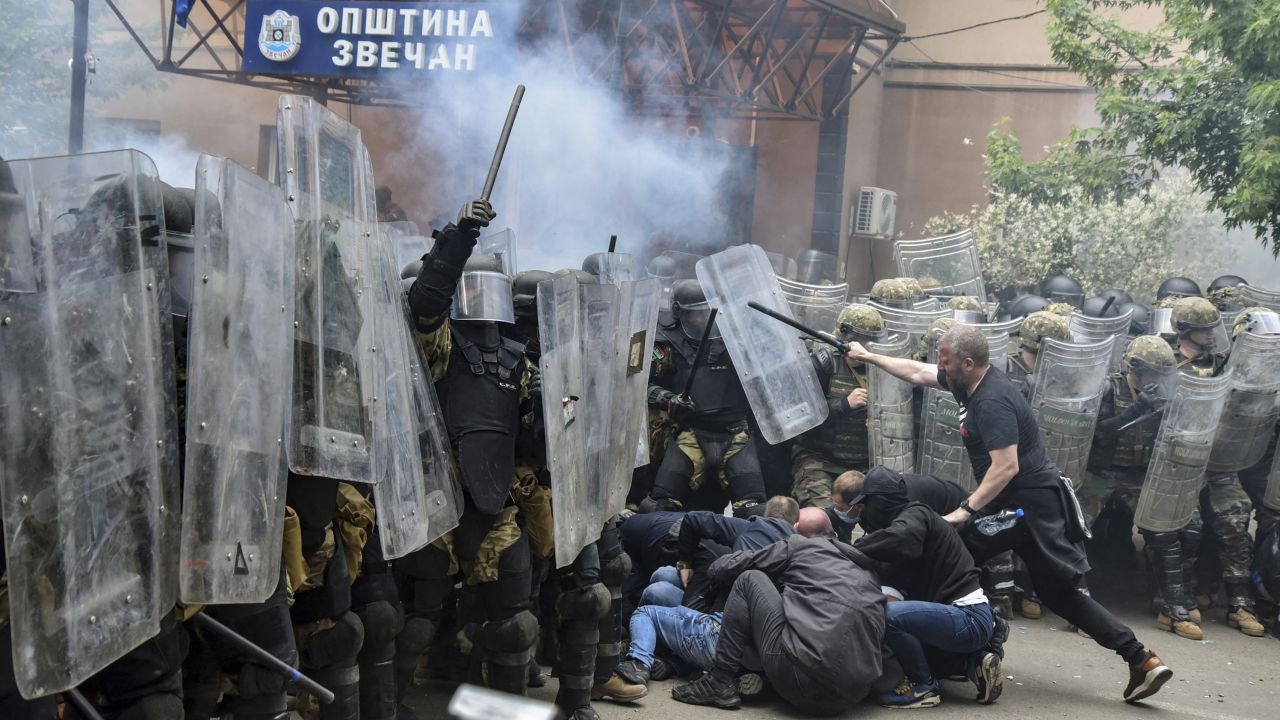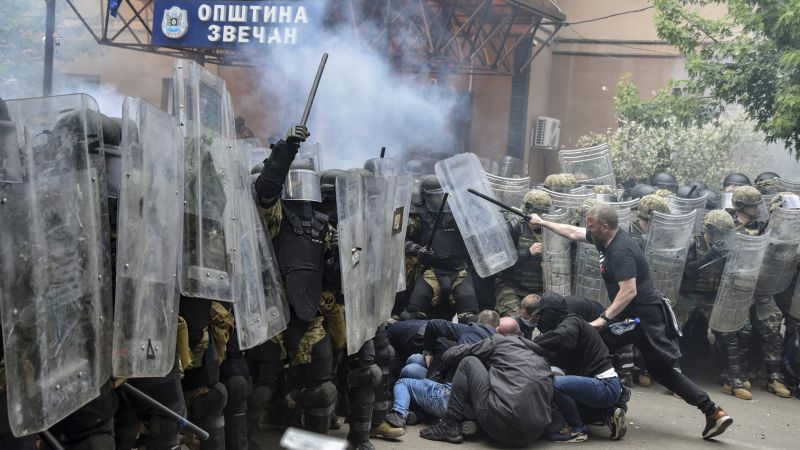CNN
—
Kosovo’s Prime Minister Albin Kurti told CNN on Tuesday that he would not surrender the country to what he described as a Serbian “fascist militia,” following violent protests in its north over the installation of ethnically Albanian mayors in a disputed election.
Dozens of NATO peacekeepers were injured on Monday after clashes erupted with Serbian demonstrators trying to block the newly elected mayors from taking office in the northern municipality of Zvecan.
NATO’s Kosovo Force (KFOR) said Tuesday that it will deploy additional forces to the region following the clashes, which saw some of its peacekeepers wounded by batons, firearms and Molotov cocktails. Demonstrators again gathered on Wednesday, assembling outside municipal buildings in Zvecan, according to Serbian state media.
“We are not facing peaceful protesters, we are facing a mob of extremists,” Kurti told CNN. “This is a fascist militia who attacked our policemen and NATO soldiers – and journalists who were on the ground reporting.”
However, Kurti’s government was criticized by the United States and others for “escalating” the conflict.
“The Government of Kosovo’s decision to force access to municipal buildings sharply and unnecessarily escalated tensions,” US Secretary of State Antony Blinken said in a statement Tuesday.
“Prime Minister Kurti and his government should ensure that elected mayors carry out their transitional duties from alternate locations outside municipal buildings, and withdraw police forces from the vicinity,” Blinken said.
Following Blinken’s statement, the US announced a raft of measures against Kosovo for the “unnecessary” crisis, including canceling its participation in US-led joint NATO exercises.
French President Emmanuel Macron also said Wednesday that authorities in Kosovo are responsible for the rising tensions in the northern region.
“We made it clear to the Kosovo authorities that it was a mistake to proceed with these elections in this context of virtual non-participation,” Macron said at a joint press conference in Slovakia on Wednesday, referring to the Serbian boycott of the vote.
When asked by CNN’s Isa Soares if he would heed calls to withdraw Kosovar police from the northern municipalities, Kurti said: “As long as there is a violent mob outside of the building, I cannot have only (a) few policemen. I need to have police who will keep the order, peace and security.”
“All international bodies did recognize the elections that we had. Once you recognize the process of elections, and its results, then mayors have to go to the municipalities. Who else should be in these municipality buildings if not the mayors?” he added.
Monday’s violence erupted after tensions bubbled for months in northern Kosovo over controversial local elections.
On November 5, four mayors belonging to the Serbian List party collectively resigned, Kurti told CNN.
They resigned partly in protest against the issue of car license plates. Kosovo has for years wanted Serbs living in the north to switch their Serbian license plates to those issued by Pristina, Kosovo’s capital.
In July, Kosovo’s government announced a two-month window in which plates had to be changed, but pushed the date back after protests. When the new date came around in November, four ethnic Serb mayors resigned, along with local judges and some 600 police officers, according to Reuters.
After this, Kurti said that the elections had to be postponed again – this time to April.
However, Serbian President Aleksandar Vucic called on Serbs in the region to boycott the elections, saying that they should no longer tolerate a foreign “occupation.” Serbian List supported the boycott, leaving ethnically Albanian candidates to run unchallenged.
After polls closed, election officials said only around 1,567 people had voted across the four Serb majority municipalities – a turnout of just 3.5% according to local media. In Zvecan, the site of Monday’s violence, the Albanian mayor won the election by barely more than 100 votes, prompting cries that his authority is illegitimate.
“The turnout was quite low because of the pressure, blackmail and threats from Belgrade to all Serbian citizens – and in particular those who were planning to run,” Kurti told CNN.
“Now we have four mayors whose legitimacy is low. But, nonetheless, there is no one who is more legitimate than them. We have to have the rule of law. We are a democratic republic,” he added.
Meliza Haradinaj, Kosovo’s former foreign affairs minister, told CNN that “the elections were evaluated as fair and democratic afterward by all Quint countries,” referring to the informal decision making group comprising the US, the United Kingdom, Germany, France and Italy.
“Now that the newly democratically elected mayors (ethnic Albanians) want to commence work in their municipal offices, the world has witnessed violent Serb gangs forcibly preventing democracy from happening,” Haradinaj said.

But many ethnic Serbs in the region feel underrepresented. The majority of Kosovo’s Serbs live in the northern regions and have increasingly demanded greater autonomy from the ethnic Albanian majority.
Kurti’s government has been accused of preventing the implementation of self-governing municipalities for Serbs, provided for under the terms of the 2013 Brussels Agreement brokered by the European Union and aimed at normalizing relations between the Balkan neighbors.
Under the agreement, Serbia could create “autonomous municipalities” in northern Kosovo, but these would have to operate under the Kosovar legal system, with Kosovar police remaining the only law enforcement authority.
More than a decade on, these municipalities have not been created, leaving disputes over the degree of autonomy for Kosovo’s Serbs to fester.
“We have a Serbian community in Kosovo which is 4% of the population. 93% are Albanian. And the rest, 3%, are other minorities: Roma, Bosniaks, Turks, Egyptians, Gorani. We want to live in a multicultural society,” Kurti told CNN.
“But we cannot have a privileged minority because Belgrade is lamenting for the loss of Kosovo in 1999 when NATO intervened to stop the genocide of the regime of (Slobodan) Milosevic,” he added.
Kosovo declared independence from Serbia in 2008 following the 1998-99 war in which Kosovar Albanians attempted to split from what was then Yugoslavia, made up of today’s Serbia and Montenegro. NATO intervened to protect Kosovo’s Albanian majority from a campaign of ethnic cleansing orchestrated by Milosevic, including by conducting an aerial bombing campaign across Yugoslavia.
“Kosovo is a success story of NATO intervention – that is what bothers both Belgrade and the Kremlin,” Kurti told CNN.
Kurti drew stark contrasts between Kosovo and neighboring Serbia, claiming: “We are a democratic, pro-European republic. Our northern neighbor, Serbia, is a pro-Russian autocracy. So there is not much democracy there, even though they have elections – since they have one party, one state, one leader.”
He also claimed that many of the “ultra-nationalist right-wingers” who protested in Kosovo on Monday “are being paid and ordered from Belgrade and who admire despotic President Putin.”
“The situation is clear: Serbia does not want peace, because it suits to keep tensions in Kosovo north so the West diverts its attention away from Ukraine,” Haradinaj told CNN. “This is Putin’s playbook – mounting Balkans as the next leg of the Ukraine war.”
Some fear that Vucic, who remains embroiled in political turmoil at home, is also attempting to use Serbian nationalism as a rallying cry for his supporters.
In comments on Tuesday, Vucic claimed that the violence in Kosovo may pose a threat to ethnic Serbs in the region, saying Serbia has “concern for the survival and security of Serbs in Kosovo.”
“Kosovo is helping him,” Bosko Jaksic, a foreign policy commentator in Belgrade, told CNN.
“He’s building his patriotic stature on Kosovo. He’s a big defender of the Serbian cause. He’s the savior of the Serbian people… All that rhetoric that we’ve heard a number of times before is being used again. And there are a lot of people who are buying it.”
Demonstrators gathered again in Zvecan on Wednesday, with employees of the local government, who used to work for the former ethnically Serbian mayor, assembling outside municipal buildings, according to Serbian state media RTS.
Protesters also carried a 250-meter-long (820-foot) Serbian flag through the streets of Zvecan, and draped more flags over barriers and anti-riot fences put up by KFOR troops.

